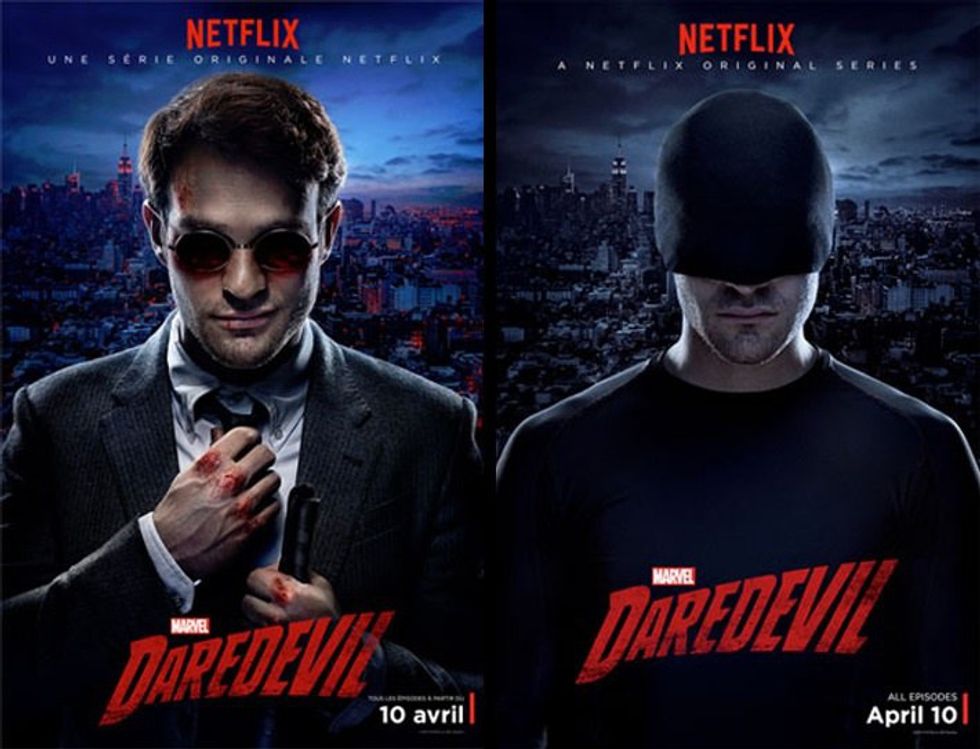Compared to the rest of the Marvel Cinematic Universe, "Daredevil" is about as dark as blood on black concrete; visually stunning, difficult to look at, and laden with extremely violent implications.
The 13-hour Netflix series follows Matt Murdock, a blind lawyer working in Hell's Kitchen, Manhattan by day, and a vigilante crime fighter with heightened senses by night.
Matt is a soft-spoken, relatively laid-back man. He's charismatic, optimistic, and efficient at his job, refusing to let his disability hold him back. He and his best friend and law firm partner, Foggy Nelson, strive to help the people of Hell's Kitchen in any way they can, while maintaining professional as well as personal integrity in the face of corruption and shady corporate dealings.
On the other hand, Matt's alter ego, known at first by crime lords and their lackeys as "The Man in the Mask," is ruthless in his tactics. He unhesitatingly uses torture as a means of extracting information, beats people to near-death, and jumps headfirst into danger with a stubborn ferocity that holds an undercurrent of unbridled rage.
To say that Matt Murdock--The Man in the Mask--is morally questionable (and conflicted) is an understatement; It can be scary to watch.

This struggle between judicial and moral law embodied in one person isn't a new concept (see Batman, Spider-Man, Green Arrow, etc.), but "Daredevil's" take on it certainly raises some difficult questions about what justice really means and how to exact it.
As a lawyer and vigilante, Matt hopes that his actions will ultimately better the common good of the people, specifically the people of Hell's Kitchen. This is what justice means to him. Ironically, this is what justice also means to Wilson Fisk, the main antagonist and Matt's foil. Both fully believe that Hell's Kitchen needs to be saved and that this justifies working outside the law. This is based on their childhood experiences showing that the law is unreliable and can't save everyone. In short, the ends justify the means. Though they come from the same premise, what makes Matt right and Fisk wrong?
In Matt's eyes--no pun intended--Hell's Kitchen is broken but worth fighting for. Although he puts as much trust as he can in the system, he knows that it is easily manipulated and that it can and will fail him. Therefore, he considers it a moral obligation to do what is right by whatever means necessary. For him, this requires physically toppling the corrupt infrastructures that feed off the very people they claim to help.
Fisk believes that Hell's Kitchen is beyond repair and needs to be destroyed from the inside out in order to be rebuilt in newfound glory. He uses his immense wealth and power to take advantage of people's greed and twists all sources of public influence to his will. His path is comprised of deception and desecration.
While Fisk's approach is steeped in all kinds of depravity, it cannot be argued that it is easier, and perhaps, more effective. If you can't beat 'em, join 'em. Then amass enough control to beat 'em anyways. At his core, Fisk is lonely and ridden with guilt, surrounding himself in luxury and fine items to keep himself from seeing the monster he's become.
Matt, however, keeps on fighting. He overcomes the corrupt murder of his father and turned it into a just cause, wanting to make sure that what happened to him doesn't happen to other people. He sees people for who they really are. Not because he physically can't, but because he still believes in the good of people despite what happened to him and trusts in those with upstanding character and judgment, something that Fisk doesn't have. While The Man in the Mask struggles with crossing the line of ethics, Matt achieves discipline and balance, and is eventually christened Daredevil, the true hero for the people of Hell's Kitchen.
In the end, Justice is blind, and his name is Matt Murdock.





















